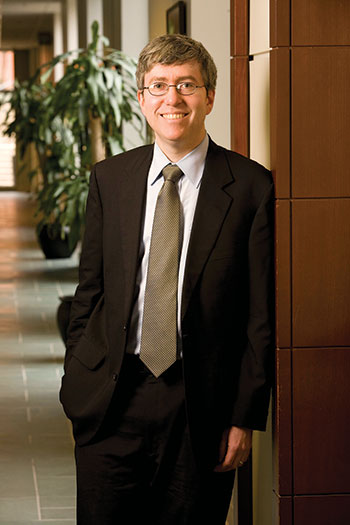
Legal historian Daniel J. Sharfstein, who co-directs Vanderbilt’s Social Justice Program, has been awarded a fellowship by the John Simon Guggenheim Memorial Foundation in the area of United States history. Often characterized as “midcareer” awards, Guggenheim Fellowships are awarded to individuals who have already demonstrated exceptional capacity for productive scholarship.
Sharfstein is one of 175 Guggenheim Fellows in the class of 2013, chosen from a field of almost 3,000 applicants. “A Guggenheim Fellowship is a singular honor, and I cannot think of anyone more deserving than Dan Sharfstein,” said Dean Chris Guthrie. “He is a creative scholar, a gifted writer, and an insightful and empathic person—and he has only begun to scratch the surface of his potential.”
Sharfstein’s fellowship project, “Thunder in the Mountains: The Clash of Two American Legends, Oliver Otis Howard and Chief Joseph of the Nez Perce,” is a book-length exploration of post-Reconstruction America. It focuses on the experiences of a Union general who headed the Freedman’s Bureau after the Civil War and later commanded Army forces against Native American tribes in the Pacific Northwest.
Sharfstein, who joined Vanderbilt’s law faculty in 2007, teaches courses in American legal history as well as Property. In 2012, he was honored with the student-selected Hall-Hartman Award for Outstanding Teaching for his seminar, The Legal History of Race in the United States.
His first book, The Invisible Line: Three American Families and the Secret Journey from Black to White (Penguin Press, 2011), won the 2012 J. Anthony Lukas Prize for nonfiction as well as the William Nelson Cromwell Book Prize awarded by the American Society for Legal History. It was also the co-winner of the James Willard Hurst Prize, awarded by the Law and Society Association for outstanding scholarship in socio-legal history. Sharfstein has also been awarded an Alphonse Fletcher Sr. fellowship and a National Endowment for the Humanities fellowship, and he was the inaugural recipient of the Raoul Berger Visiting Fellowship in Legal History at Harvard Law School.